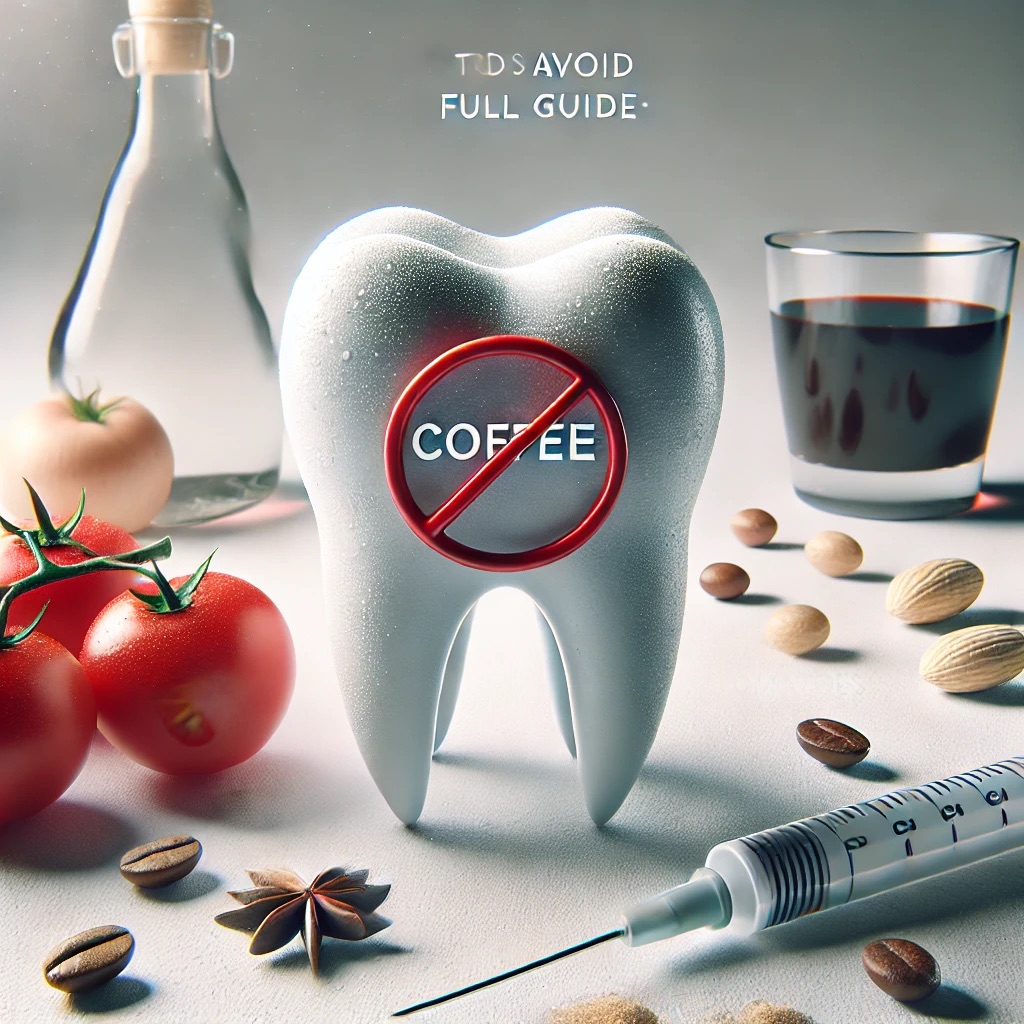Meta Description: Learn about the foods to avoid after teeth whitening to prevent stains and keep your smile bright. Follow this guide for tips on protecting your results and maintaining a white smile, based on recommendations from our partner clinics.
Summary
Teeth whitening treatments coordinated by Tour Medical through our trusted partner clinics can give you a brighter smile, but your diet immediately after the procedure plays a critical role in maintaining those results. This guide will explore the foods to avoid after teeth whitening, the reasons why, and how long you should steer clear of certain items to protect your newly whitened teeth.
Introduction: Why Avoid Certain Foods After Teeth Whitening?
Teeth whitening treatments open up the pores in your enamel, making your teeth more vulnerable to stains for the first 24-72 hours after the procedure. During this time, it's important to avoid consuming foods and beverages that can cause discoloration, as they can easily seep into the enamel and undo the effects of your whitening treatment. In this guide, we’ll cover the most common foods to avoid after teeth whitening and how to protect your smile for long-lasting results.
Foods and Beverages That Cause Staining
Certain foods and drinks are notorious for their ability to stain teeth due to their high levels of pigments, tannins, or acids. Avoiding these items during the first few days after whitening can help ensure your teeth remain bright and stain-free.
1. Coffee and Tea
Coffee and tea are among the most common culprits of tooth staining. These beverages contain dark pigments and tannins, which can easily penetrate your enamel and cause discoloration.
- Tip: If you can’t go without your coffee or tea, consider drinking it through a straw to minimize contact with your teeth.
Focus Keyword in Context: Coffee and tea are major foods to avoid after teeth whitening as they can quickly re-stain your teeth.
2. Red Wine
Red wine is another beverage known for causing stains. Its deep, dark color and acidity make it one of the worst drinks to consume right after whitening. Red wine can stain the newly whitened enamel, which is more porous during the first 48-72 hours after the procedure.
- Tip: If you're in a social setting, opt for white wine instead, which is less likely to stain your teeth.
3. Dark-Colored Sauces
Certain sauces, such as soy sauce, tomato sauce, and curry, are highly pigmented and can easily stain teeth. These sauces are often used in a variety of dishes, so it's important to be mindful of your food choices during the initial post-whitening period.
- Tip: Stick to lighter sauces like cream-based or white sauces for a few days after whitening.
4. Berries and Dark Fruits
Fruits like blueberries, blackberries, cherries, and pomegranates are delicious but can leave behind stubborn stains due to their intense pigmentation. While fruits are an important part of a healthy diet, it's best to avoid dark-colored fruits temporarily.
- Tip: Opt for lighter fruits like bananas or apples (without the skin) to avoid staining your teeth after whitening.
5. Soda and Energy Drinks
Soda and energy drinks are acidic and can erode your enamel, making it easier for stains to set in. Additionally, dark-colored sodas like cola contain pigments that can quickly re-stain your teeth.
- Tip: Stick to water or milk during the post-whitening period to avoid staining and protect your enamel.
Acidic Foods and Drinks to Avoid
After teeth whitening, it’s not just the color of foods and drinks that matters. Acidic foods and beverages can weaken your enamel and increase the risk of staining. It’s important to limit or avoid acidic items after whitening to prevent enamel erosion.
1. Citrus Fruits
Citrus fruits like lemons, oranges, and grapefruits are highly acidic, which can weaken your enamel and make your teeth more prone to staining. While these fruits are rich in vitamins, it's best to avoid them immediately after whitening.
- Tip: If you enjoy citrus fruits, try waiting a few days before reintroducing them to your diet.
2. Vinegar-Based Foods
Foods that contain vinegar, such as pickles, salad dressings, and condiments, are acidic and can damage your enamel post-whitening. Even balsamic vinegar, often used in salads, can darken and stain your teeth if consumed right after whitening.
- Tip: Use oil-based dressings or light mayonnaise as a substitute to avoid staining and protect your enamel.
Safe Foods to Eat After Teeth Whitening
While avoiding certain foods and drinks is crucial, there are plenty of safe options you can enjoy that won't stain your teeth. These "white diet" foods are light in color and won’t contribute to discoloration after whitening.
Best Foods to Eat After Whitening:
- Chicken, Turkey, and White Fish: Lean proteins that won’t stain your teeth.
- Rice and Pasta: These are great options, but stick to light sauces like Alfredo or olive oil.
- Eggs: Scrambled, boiled, or poached eggs are excellent choices.
- Potatoes: Mashed or baked potatoes (without ketchup or colored sauces) are safe and filling.
- Bananas and Pears: These light-colored fruits are easy on your enamel and won’t cause staining.
- Cauliflower and Cucumbers: These veggies are both light-colored and full of nutrients, making them safe post-whitening options.
Sticking to these foods will help protect your teeth and ensure your whitening results last.
How Long Should You Avoid Staining Foods After Whitening?
The critical window for avoiding stain-causing foods and drinks is the first 48-72 hours after your teeth whitening treatment. During this time, your teeth are more porous and vulnerable to stains. However, if you want to extend the lifespan of your whitening results, it’s best to limit your consumption of staining foods and drinks over the long term.
- 48 hours: Strictly avoid any staining or acidic foods and drinks.
- Beyond 72 hours: You can gradually reintroduce these foods, but it’s best to enjoy them in moderation and follow good oral hygiene practices to maintain your results.
How to Protect Your Teeth from Stains After Whitening
In addition to avoiding certain foods, there are other steps you can take to protect your teeth from stains after whitening.
1. Use a Straw for Dark Beverages
If you decide to drink coffee, tea, or soda after whitening, use a straw to minimize contact between the liquid and your teeth.
2. Rinse Your Mouth After Eating or Drinking
After consuming staining foods or beverages, rinse your mouth with water to wash away any pigments before they have a chance to settle on your teeth.
3. Maintain Good Oral Hygiene
Brushing your teeth twice a day and flossing daily can help prevent stains and keep your teeth white. Consider using a whitening toothpaste to maintain your results.
Frequently Asked Questions About Foods to Avoid After Whitening
1. Can I drink coffee after teeth whitening?
It's best to avoid coffee for at least 48 hours after teeth whitening. If you can’t resist, drink it through a straw and rinse your mouth afterward to minimize staining.
2. How long should I avoid red wine after whitening?
You should avoid red wine for at least 48-72 hours after whitening to prevent re-staining. Consider switching to white wine during this period.
3. Can I eat tomatoes or tomato sauce after teeth whitening?
Tomatoes and tomato sauce are highly pigmented and acidic, so it’s best to avoid them for the first few days after whitening.
4. What foods can I eat after teeth whitening?
You can eat light-colored foods like chicken, fish, rice, pasta, potatoes, and bananas. These won’t stain your teeth and are safe options immediately after whitening.
Conclusion: Foods to Avoid After Teeth Whitening
After a teeth whitening treatment, it’s essential to avoid certain foods and drinks that can re-stain your teeth, especially in the first 48-72 hours. Items like coffee, tea, red wine, and dark sauces should be avoided to protect your bright smile. By sticking to a light, safe diet and practicing good oral hygiene, you can maintain your whitening results for longer and keep your teeth looking their best.
For more information on maintaining your teeth after whitening or to explore additional dental treatments, visit Dentist Kusadasi for expert advice and care.

 English
English




















